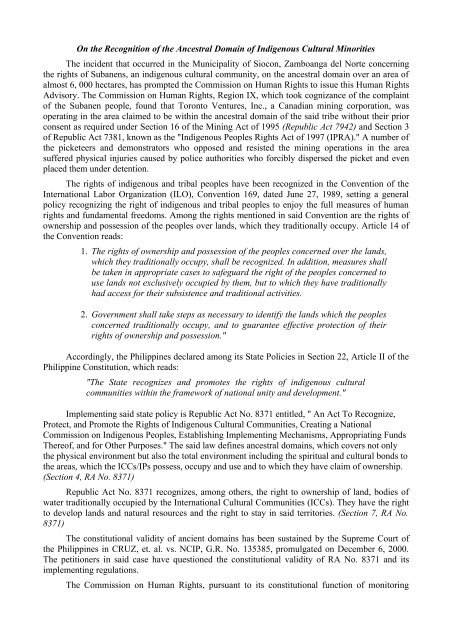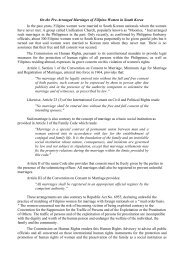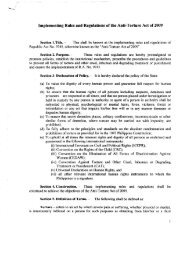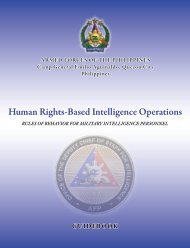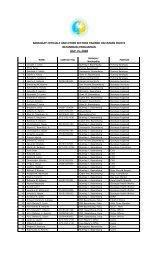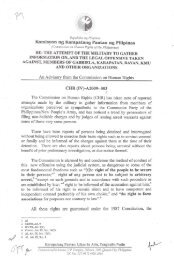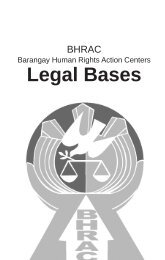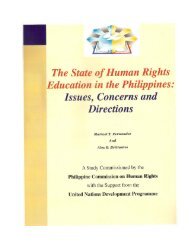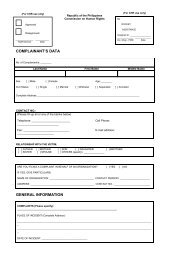On the Recognition of the Ancestral Domain of Indigenous Cultural ...
On the Recognition of the Ancestral Domain of Indigenous Cultural ...
On the Recognition of the Ancestral Domain of Indigenous Cultural ...
Create successful ePaper yourself
Turn your PDF publications into a flip-book with our unique Google optimized e-Paper software.
<strong>On</strong> <strong>the</strong> <strong>Recognition</strong> <strong>of</strong> <strong>the</strong> <strong>Ancestral</strong> <strong>Domain</strong> <strong>of</strong> <strong>Indigenous</strong> <strong>Cultural</strong> Minorities<br />
The incident that occurred in <strong>the</strong> Municipality <strong>of</strong> Siocon, Zamboanga del Norte concerning<br />
<strong>the</strong> rights <strong>of</strong> Subanens, an indigenous cultural community, on <strong>the</strong> ancestral domain over an area <strong>of</strong><br />
almost 6, 000 hectares, has prompted <strong>the</strong> Commission on Human Rights to issue this Human Rights<br />
Advisory. The Commission on Human Rights, Region IX, which took cognizance <strong>of</strong> <strong>the</strong> complaint<br />
<strong>of</strong> <strong>the</strong> Subanen people, found that Toronto Ventures, Inc., a Canadian mining corporation, was<br />
operating in <strong>the</strong> area claimed to be within <strong>the</strong> ancestral domain <strong>of</strong> <strong>the</strong> said tribe without <strong>the</strong>ir prior<br />
consent as required under Section 16 <strong>of</strong> <strong>the</strong> Mining Act <strong>of</strong> 1995 (Republic Act 7942) and Section 3<br />
<strong>of</strong> Republic Act 7381, known as <strong>the</strong> "<strong>Indigenous</strong> Peoples Rights Act <strong>of</strong> 1997 (IPRA)." A number <strong>of</strong><br />
<strong>the</strong> picketeers and demonstrators who opposed and resisted <strong>the</strong> mining operations in <strong>the</strong> area<br />
suffered physical injuries caused by police authorities who forcibly dispersed <strong>the</strong> picket and even<br />
placed <strong>the</strong>m under detention.<br />
The rights <strong>of</strong> indigenous and tribal peoples have been recognized in <strong>the</strong> Convention <strong>of</strong> <strong>the</strong><br />
International Labor Organization (ILO), Convention 169, dated June 27, 1989, setting a general<br />
policy recognizing <strong>the</strong> right <strong>of</strong> indigenous and tribal peoples to enjoy <strong>the</strong> full measures <strong>of</strong> human<br />
rights and fundamental freedoms. Among <strong>the</strong> rights mentioned in said Convention are <strong>the</strong> rights <strong>of</strong><br />
ownership and possession <strong>of</strong> <strong>the</strong> peoples over lands, which <strong>the</strong>y traditionally occupy. Article 14 <strong>of</strong><br />
<strong>the</strong> Convention reads:<br />
1. The rights <strong>of</strong> ownership and possession <strong>of</strong> <strong>the</strong> peoples concerned over <strong>the</strong> lands,<br />
which <strong>the</strong>y traditionally occupy, shall be recognized. In addition, measures shall<br />
be taken in appropriate cases to safeguard <strong>the</strong> right <strong>of</strong> <strong>the</strong> peoples concerned to<br />
use lands not exclusively occupied by <strong>the</strong>m, but to which <strong>the</strong>y have traditionally<br />
had access for <strong>the</strong>ir subsistence and traditional activities.<br />
2. Government shall take steps as necessary to identify <strong>the</strong> lands which <strong>the</strong> peoples<br />
concerned traditionally occupy, and to guarantee effective protection <strong>of</strong> <strong>the</strong>ir<br />
rights <strong>of</strong> ownership and possession."<br />
Accordingly, <strong>the</strong> Philippines declared among its State Policies in Section 22, Article II <strong>of</strong> <strong>the</strong><br />
Philippine Constitution, which reads:<br />
"The State recognizes and promotes <strong>the</strong> rights <strong>of</strong> indigenous cultural<br />
communities within <strong>the</strong> framework <strong>of</strong> national unity and development."<br />
Implementing said state policy is Republic Act No. 8371 entitled, " An Act To Recognize,<br />
Protect, and Promote <strong>the</strong> Rights <strong>of</strong> <strong>Indigenous</strong> <strong>Cultural</strong> Communities, Creating a National<br />
Commission on <strong>Indigenous</strong> Peoples, Establishing Implementing Mechanisms, Appropriating Funds<br />
There<strong>of</strong>, and for O<strong>the</strong>r Purposes." The said law defines ancestral domains, which covers not only<br />
<strong>the</strong> physical environment but also <strong>the</strong> total environment including <strong>the</strong> spiritual and cultural bonds to<br />
<strong>the</strong> areas, which <strong>the</strong> ICCs/IPs possess, occupy and use and to which <strong>the</strong>y have claim <strong>of</strong> ownership.<br />
(Section 4, RA No. 8371)<br />
Republic Act No. 8371 recognizes, among o<strong>the</strong>rs, <strong>the</strong> right to ownership <strong>of</strong> land, bodies <strong>of</strong><br />
water traditionally occupied by <strong>the</strong> International <strong>Cultural</strong> Communities (ICCs). They have <strong>the</strong> right<br />
to develop lands and natural resources and <strong>the</strong> right to stay in said territories. (Section 7, RA No.<br />
8371)<br />
The constitutional validity <strong>of</strong> ancient domains has been sustained by <strong>the</strong> Supreme Court <strong>of</strong><br />
<strong>the</strong> Philippines in CRUZ, et. al. vs. NCIP, G.R. No. 135385, promulgated on December 6, 2000.<br />
The petitioners in said case have questioned <strong>the</strong> constitutional validity <strong>of</strong> RA No. 8371 and its<br />
implementing regulations.<br />
The Commission on Human Rights, pursuant to its constitutional function <strong>of</strong> monitoring
Philippine government's compliance with international treaty obligations in human rights (Art. XIII,<br />
Sec. 18[7]), issues this human rights advisory to remind all concerned, especially government<br />
authorities and agencies, to respect <strong>the</strong> aforesaid international instruments on human rights and <strong>the</strong><br />
constitutional policy and its implementing legislations, RA No. 8371, including its rules and<br />
regulations, for <strong>the</strong>ir information and guidance.<br />
Quezon City, 13 September 2001


